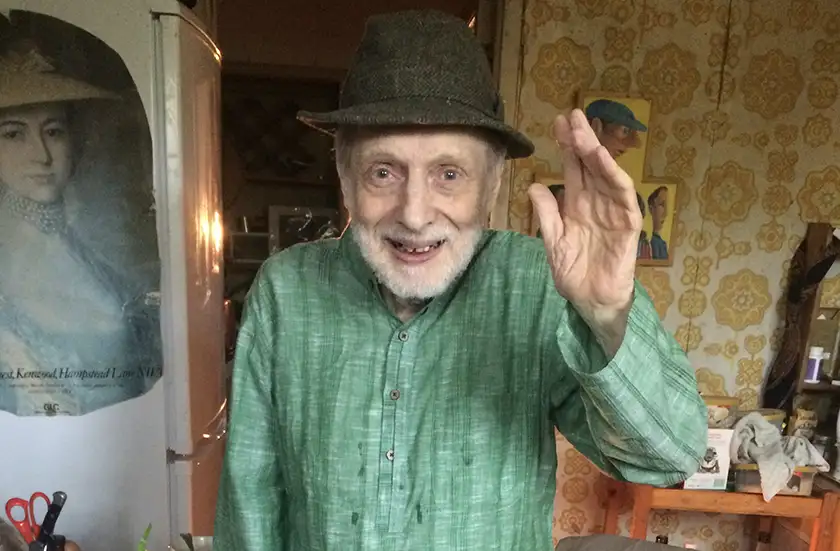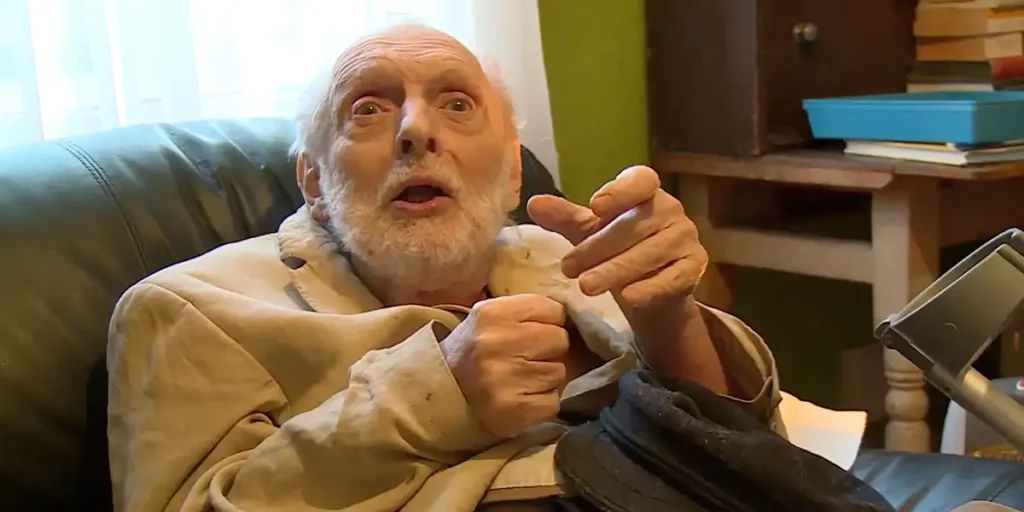With Much Ado About Dying, Simon Chambers gives a spotlight to the unglamorous moments and unconditional love that comes from caring for our elders.
Much Ado About Dying shines a light on the unglamorous and completely thankless job of caring for our elders. It addresses the societal discomfort facing elder care and indulges the sheer discomfort we have for conversations surrounding death as they bring up emotions that make us face our own mortality. However, in his documentary about his ailing uncle’s final four years of life, Simon Chambers beautifully immortalizes both the spirit of his uncle David and the unconditional love that is shown in the way we care for those we love.
Chambers set out to be a serious documentary filmmaker, making serious films about serious problems facing the world. When his life felt flat and terribly unexciting, he moved to Delhi, hoping that the second most populated city in the world would hold a sense of purpose and direction he felt he lacked. He chased an idea he had to make a film about the automobile traffic the city faced but was repeatedly interrupted by sporadic and unpredictable phone calls from his eccentric uncle, David, whose health had been steadily deteriorating. David begged Simon to return to the UK to tend to his aid, refusing help from Simon’s sisters, and eventually leaving Simon no choice but to come home.
When he returns, Simon finds that while his uncle is clearly unwell, he is truly the same captivating character he has known his whole life. David, a former Shakespearean actor, becomes engulfed in the opportunity to perform from his newly captive audience (Simon) and obsesses over a particular favorite play he never got the opportunity to star in himself, “King Lear”. As the film progresses and David’s health continues to worsen, life begins to not only imitate but blend with art in this masterful look at death and elder care.
Much Ado About Dying is a film that will linger with you. By the end of its runtime, David is no longer a character or subject in a faraway place, but an old friend whose loss feels incredibly profound. While the film is framed on a man you have never met before, throughout its course you begin to see every loved one you have lost in a similar vein in David. The pain and the heartbreak that Simon endures as he desperately tries to do right by his uncle, with no guide on how to care for him, becomes all too palpable and his helplessness feels all too visceral.

It’d be an injustice, however, to say this film is simply a study on tragedy. That’s not what Chambers is saying with his beautifully crafted movie, nor is it what David’s legacy deserves to be. Within the heartache of this time, Chambers focuses on the joy that David is able to find in the darkest of days and the most tragic of incidences. While we as an audience are watching as a human being’s life dwindles before us, we also witness a great actor in the film performance of his life. David, ever the showman, refuses to leave the audience bored with sadness and keeps us on our toes throughout the entirety of the film with his positive disposition and inability to be dull.
The film is not framed in a terribly complex form: the majority of the shots are of David sitting around his home, wearing only a bathroom, reciting old monologues and going off on tangents rather than answering the pressing questions regarding his health. These scenes are juxtaposed with moments where Simon narrates his attempts to find someone within the U.K. health system to show any ounce of care or guidance as to what he should do for his uncle and how to do “right” by him.
This is the magic in Chambers’ approach. He lets David be the star that he is, creating a two prong story about life and purpose. On the one hand, the audience and the subjects of the film know with absolute certainty that David is dying and we are watching a man make peace with his life right before his death. On the other hand, we watch as a man, who desperately wants to help his uncle, struggles with how to care for David. as he lacks a sense of control over his own life, much less David’s. In many ways, we are seeing one man at the very start and one man at the very end of their lives, who both need each other very much.
When the film starts off, Simon is directionless, wanting to make a movie about people in the new city he aims to call home but feeling an impossible space from those whose lives he’s capturing. When the subject of his film flips to his elderly uncle, he suddenly creates a piece on someone he’s known his entire life. While Simon admittedly doesn’t know what to do with his dying uncle, he at least is given a real and absolute purpose. During his time with David, Simon’s obligation to care for him evolves into a completely unique opportunity to study someone in their final stages of life who is content in the way he has lived it.
David has these monologues where he goes on and on, seemingly about nothing, as Simon just tries to get information out of him, but the audience and Simon himself begin to understand that these aren’t just ramblings for attention but rather some of the most important conversations David could have with his directionless nephew. David has such an incredibly strong sense of identity, coming out when he was 55 years old, where Simon is admittedly terribly lost. While the film starts off with David rambling on, the more time both Simon and the audience spend with David, the more attention is paid to the importance of David’s obsession with getting out these tales.
Simon asks David more questions and gets to know him in a more personal manner, which while feels almost silly to say about a nephew and uncle rings true for their relationship. Through this evolution in the film, Chambers exemplifies the depth and the shift in dynamics that come when you become a primary caretaker of a dying family member. The conversations you look over and the moments you brush off become so much more important than ever before. There’s an awareness of how fleeting time is, and how ignorant we are of it before we are put in a situation where it is abhorrently clear that it is running out.
There are so many elements of Much Ado About Dying that make the film feel extraordinary, but I’d be remiss to not give David his flowers for the final performance of his career. The content and joy that David welcomes at the end of his life moved me to tears. Even while in pain and after being taken advantage of so many times due to his ailing health, David remains kind and optimistic and playful in a way I hope we all get to when our time comes.
Much Ado About Dying doesn’t shy away from the viscerally upsetting moments; Chambers includes them because, ultimately, the film wouldn’t work without utter transparency. It’s a celebration of life and an acknowledgment of the tough waters we must navigate in regards to death. There’s an honesty that permeates the film, about the struggles that Simon faces trying to take on a role he has never had to perform before. But there’s also an honesty about David’s life and the mistakes he made when longing to trust the people he loved, and about the reality of dying and having to watch someone who you’ve never lived without wither away in front of your eyes. But more impactful than anything, there’s an honesty about David’s attitude towards death.
When Simon started recording his interactions with his dying uncle, he didn’t do it with the intent of creating this film. He was capturing life as it was happening. Simon documented the highs and lows of his time with David, from house fire’s to holidays and every small moment in between. Unaware of it at the start, Chambers set out to immortalize his uncle, eccentricities and all, and we the audience are beyond lucky he did. Through the making of this film Chambers has given the audience a lesson in life that extends beyond circumstance. When asking his uncle what advice he would impart on others, David said to not worry too much, because eventually things fall into place and when you look back on your life, you’ll be most grateful for the small, seemingly insignificant things that signify peace, like sunlight in the garden.
This wasis not an easy film to create. If Simon had shied away from the upsetting and frightening moments with David, it would not have been nearly as personal yet completely universal. Much Ado About Dying so beautifully and thoughtfully captures the concept of letting go of the things that bring you anxieties and noticing the moments that bring you peace. It reminds you how much there is to learn from your elders, how important it is to be there for the people you love, and that you don’t need to have all the answers so long as you acknowledge how lucky you are to be able to contemplate life’s greatest questions.
Much Ado About Dying was released in New York (Film Forum) on March 15, in Los Angeles on March 22, and in UK cinemas from May 3. the film will be available on DVD from December 3, 2024. Read our interview with Much Ado About Dying director Simon Chambers.

